Hospitality Business Strategies
VerifiedAdded on 2023/01/11
|12
|3447
|91
AI Summary
This article discusses the importance of business strategies in the hospitality industry, focusing on the external and internal factors that affect the success of a hotel. It explores the use of PESTEL, SWOT, VRIO, and Porter's Five Forces analysis in strategic management. Additionally, it explains how the Ansoff matrix can guide hotel development.
Contribute Materials
Your contribution can guide someone’s learning journey. Share your
documents today.
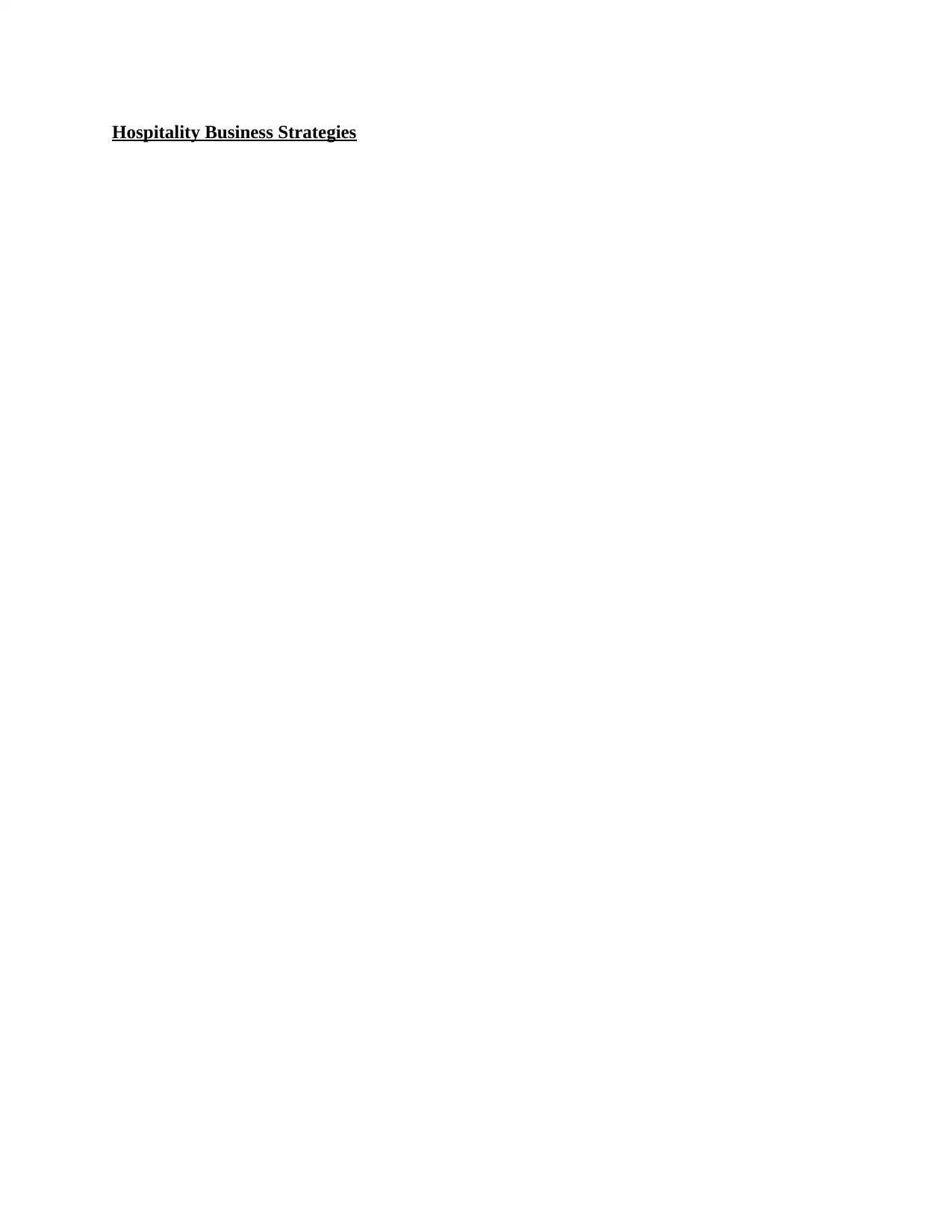
Hospitality Business Strategies
Secure Best Marks with AI Grader
Need help grading? Try our AI Grader for instant feedback on your assignments.
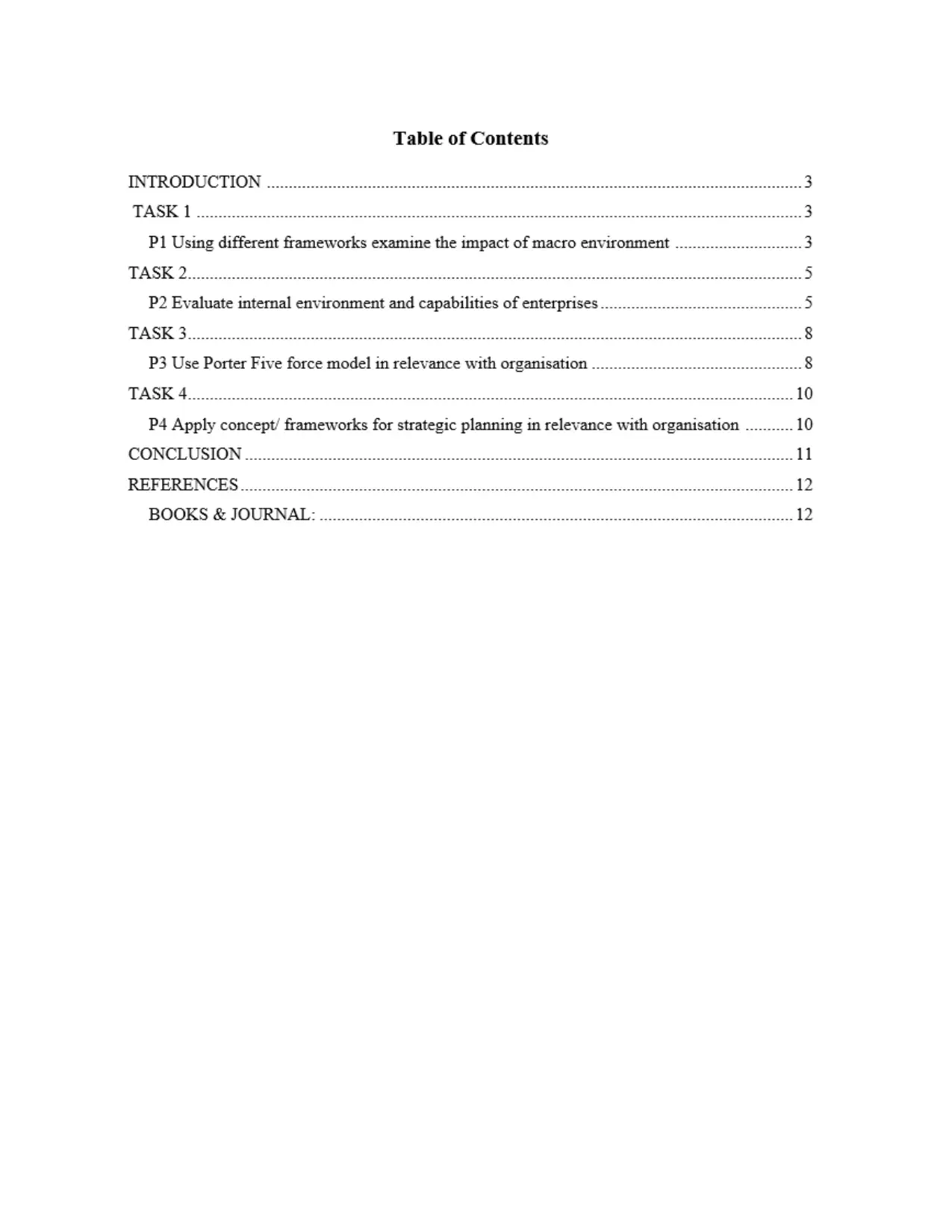
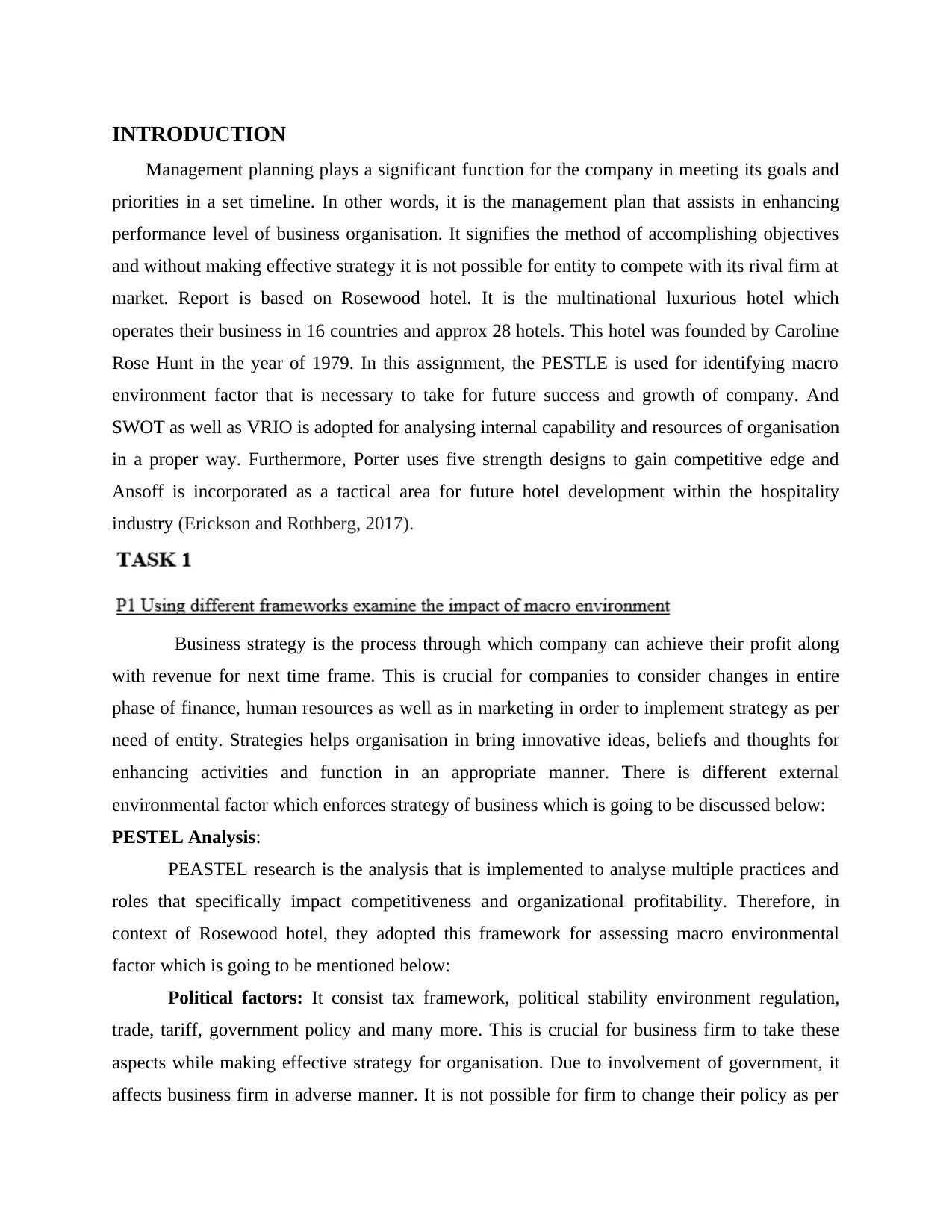
INTRODUCTION
Management planning plays a significant function for the company in meeting its goals and
priorities in a set timeline. In other words, it is the management plan that assists in enhancing
performance level of business organisation. It signifies the method of accomplishing objectives
and without making effective strategy it is not possible for entity to compete with its rival firm at
market. Report is based on Rosewood hotel. It is the multinational luxurious hotel which
operates their business in 16 countries and approx 28 hotels. This hotel was founded by Caroline
Rose Hunt in the year of 1979. In this assignment, the PESTLE is used for identifying macro
environment factor that is necessary to take for future success and growth of company. And
SWOT as well as VRIO is adopted for analysing internal capability and resources of organisation
in a proper way. Furthermore, Porter uses five strength designs to gain competitive edge and
Ansoff is incorporated as a tactical area for future hotel development within the hospitality
industry (Erickson and Rothberg, 2017).
Business strategy is the process through which company can achieve their profit along
with revenue for next time frame. This is crucial for companies to consider changes in entire
phase of finance, human resources as well as in marketing in order to implement strategy as per
need of entity. Strategies helps organisation in bring innovative ideas, beliefs and thoughts for
enhancing activities and function in an appropriate manner. There is different external
environmental factor which enforces strategy of business which is going to be discussed below:
PESTEL Analysis:
PEASTEL research is the analysis that is implemented to analyse multiple practices and
roles that specifically impact competitiveness and organizational profitability. Therefore, in
context of Rosewood hotel, they adopted this framework for assessing macro environmental
factor which is going to be mentioned below:
Political factors: It consist tax framework, political stability environment regulation,
trade, tariff, government policy and many more. This is crucial for business firm to take these
aspects while making effective strategy for organisation. Due to involvement of government, it
affects business firm in adverse manner. It is not possible for firm to change their policy as per
Management planning plays a significant function for the company in meeting its goals and
priorities in a set timeline. In other words, it is the management plan that assists in enhancing
performance level of business organisation. It signifies the method of accomplishing objectives
and without making effective strategy it is not possible for entity to compete with its rival firm at
market. Report is based on Rosewood hotel. It is the multinational luxurious hotel which
operates their business in 16 countries and approx 28 hotels. This hotel was founded by Caroline
Rose Hunt in the year of 1979. In this assignment, the PESTLE is used for identifying macro
environment factor that is necessary to take for future success and growth of company. And
SWOT as well as VRIO is adopted for analysing internal capability and resources of organisation
in a proper way. Furthermore, Porter uses five strength designs to gain competitive edge and
Ansoff is incorporated as a tactical area for future hotel development within the hospitality
industry (Erickson and Rothberg, 2017).
Business strategy is the process through which company can achieve their profit along
with revenue for next time frame. This is crucial for companies to consider changes in entire
phase of finance, human resources as well as in marketing in order to implement strategy as per
need of entity. Strategies helps organisation in bring innovative ideas, beliefs and thoughts for
enhancing activities and function in an appropriate manner. There is different external
environmental factor which enforces strategy of business which is going to be discussed below:
PESTEL Analysis:
PEASTEL research is the analysis that is implemented to analyse multiple practices and
roles that specifically impact competitiveness and organizational profitability. Therefore, in
context of Rosewood hotel, they adopted this framework for assessing macro environmental
factor which is going to be mentioned below:
Political factors: It consist tax framework, political stability environment regulation,
trade, tariff, government policy and many more. This is crucial for business firm to take these
aspects while making effective strategy for organisation. Due to involvement of government, it
affects business firm in adverse manner. It is not possible for firm to change their policy as per
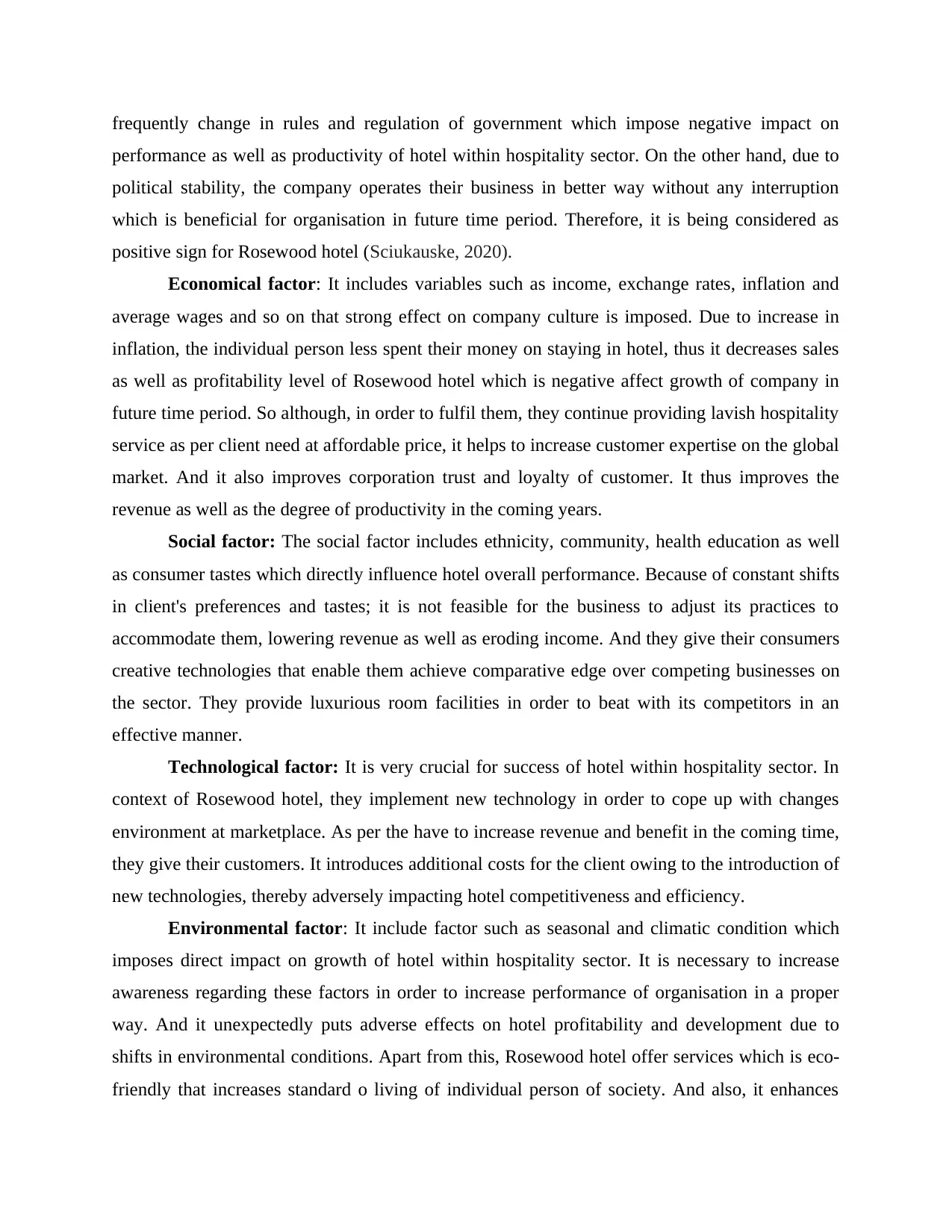
frequently change in rules and regulation of government which impose negative impact on
performance as well as productivity of hotel within hospitality sector. On the other hand, due to
political stability, the company operates their business in better way without any interruption
which is beneficial for organisation in future time period. Therefore, it is being considered as
positive sign for Rosewood hotel (Sciukauske, 2020).
Economical factor: It includes variables such as income, exchange rates, inflation and
average wages and so on that strong effect on company culture is imposed. Due to increase in
inflation, the individual person less spent their money on staying in hotel, thus it decreases sales
as well as profitability level of Rosewood hotel which is negative affect growth of company in
future time period. So although, in order to fulfil them, they continue providing lavish hospitality
service as per client need at affordable price, it helps to increase customer expertise on the global
market. And it also improves corporation trust and loyalty of customer. It thus improves the
revenue as well as the degree of productivity in the coming years.
Social factor: The social factor includes ethnicity, community, health education as well
as consumer tastes which directly influence hotel overall performance. Because of constant shifts
in client's preferences and tastes; it is not feasible for the business to adjust its practices to
accommodate them, lowering revenue as well as eroding income. And they give their consumers
creative technologies that enable them achieve comparative edge over competing businesses on
the sector. They provide luxurious room facilities in order to beat with its competitors in an
effective manner.
Technological factor: It is very crucial for success of hotel within hospitality sector. In
context of Rosewood hotel, they implement new technology in order to cope up with changes
environment at marketplace. As per the have to increase revenue and benefit in the coming time,
they give their customers. It introduces additional costs for the client owing to the introduction of
new technologies, thereby adversely impacting hotel competitiveness and efficiency.
Environmental factor: It include factor such as seasonal and climatic condition which
imposes direct impact on growth of hotel within hospitality sector. It is necessary to increase
awareness regarding these factors in order to increase performance of organisation in a proper
way. And it unexpectedly puts adverse effects on hotel profitability and development due to
shifts in environmental conditions. Apart from this, Rosewood hotel offer services which is eco-
friendly that increases standard o living of individual person of society. And also, it enhances
performance as well as productivity of hotel within hospitality sector. On the other hand, due to
political stability, the company operates their business in better way without any interruption
which is beneficial for organisation in future time period. Therefore, it is being considered as
positive sign for Rosewood hotel (Sciukauske, 2020).
Economical factor: It includes variables such as income, exchange rates, inflation and
average wages and so on that strong effect on company culture is imposed. Due to increase in
inflation, the individual person less spent their money on staying in hotel, thus it decreases sales
as well as profitability level of Rosewood hotel which is negative affect growth of company in
future time period. So although, in order to fulfil them, they continue providing lavish hospitality
service as per client need at affordable price, it helps to increase customer expertise on the global
market. And it also improves corporation trust and loyalty of customer. It thus improves the
revenue as well as the degree of productivity in the coming years.
Social factor: The social factor includes ethnicity, community, health education as well
as consumer tastes which directly influence hotel overall performance. Because of constant shifts
in client's preferences and tastes; it is not feasible for the business to adjust its practices to
accommodate them, lowering revenue as well as eroding income. And they give their consumers
creative technologies that enable them achieve comparative edge over competing businesses on
the sector. They provide luxurious room facilities in order to beat with its competitors in an
effective manner.
Technological factor: It is very crucial for success of hotel within hospitality sector. In
context of Rosewood hotel, they implement new technology in order to cope up with changes
environment at marketplace. As per the have to increase revenue and benefit in the coming time,
they give their customers. It introduces additional costs for the client owing to the introduction of
new technologies, thereby adversely impacting hotel competitiveness and efficiency.
Environmental factor: It include factor such as seasonal and climatic condition which
imposes direct impact on growth of hotel within hospitality sector. It is necessary to increase
awareness regarding these factors in order to increase performance of organisation in a proper
way. And it unexpectedly puts adverse effects on hotel profitability and development due to
shifts in environmental conditions. Apart from this, Rosewood hotel offer services which is eco-
friendly that increases standard o living of individual person of society. And also, it enhances
Secure Best Marks with AI Grader
Need help grading? Try our AI Grader for instant feedback on your assignments.
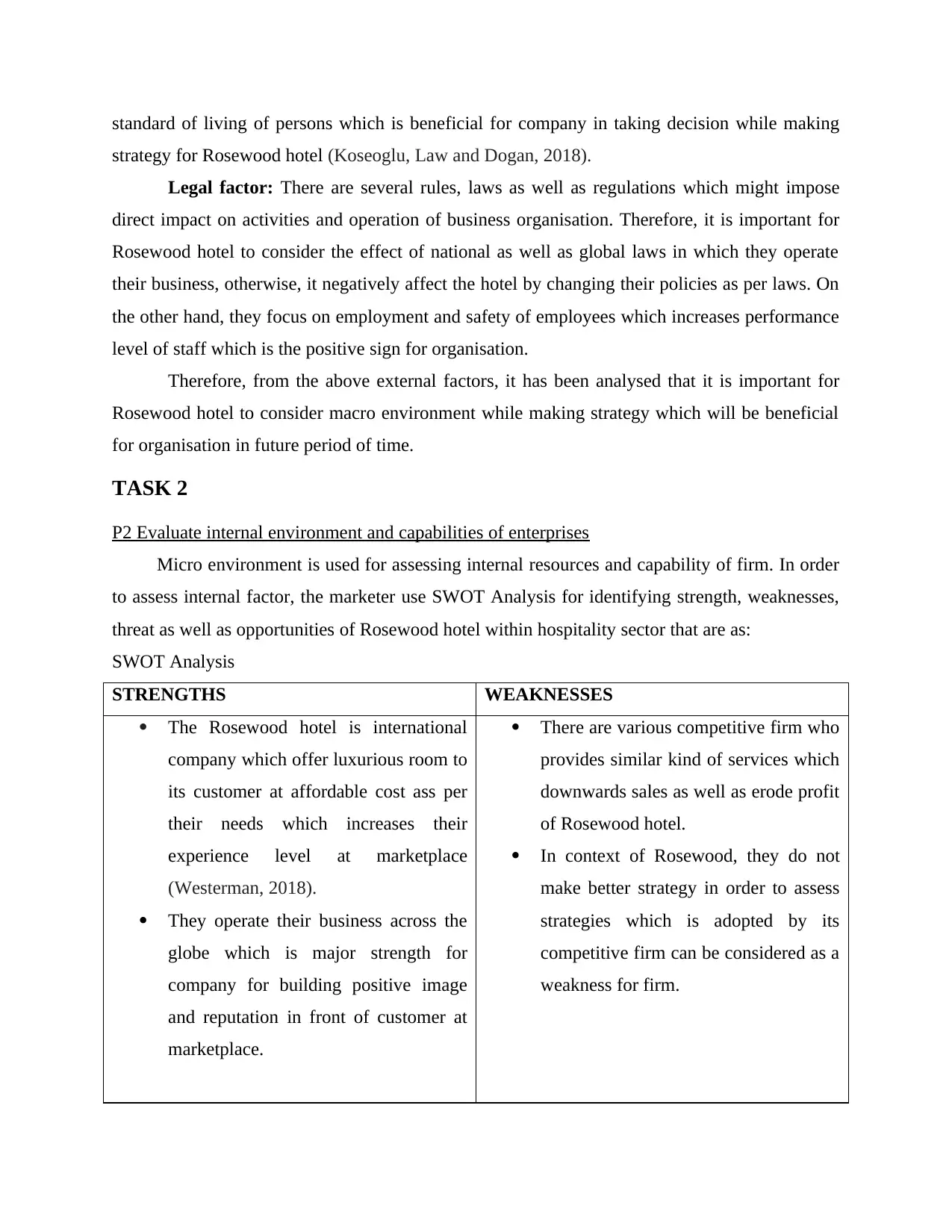
standard of living of persons which is beneficial for company in taking decision while making
strategy for Rosewood hotel (Koseoglu, Law and Dogan, 2018).
Legal factor: There are several rules, laws as well as regulations which might impose
direct impact on activities and operation of business organisation. Therefore, it is important for
Rosewood hotel to consider the effect of national as well as global laws in which they operate
their business, otherwise, it negatively affect the hotel by changing their policies as per laws. On
the other hand, they focus on employment and safety of employees which increases performance
level of staff which is the positive sign for organisation.
Therefore, from the above external factors, it has been analysed that it is important for
Rosewood hotel to consider macro environment while making strategy which will be beneficial
for organisation in future period of time.
TASK 2
P2 Evaluate internal environment and capabilities of enterprises
Micro environment is used for assessing internal resources and capability of firm. In order
to assess internal factor, the marketer use SWOT Analysis for identifying strength, weaknesses,
threat as well as opportunities of Rosewood hotel within hospitality sector that are as:
SWOT Analysis
STRENGTHS WEAKNESSES
The Rosewood hotel is international
company which offer luxurious room to
its customer at affordable cost ass per
their needs which increases their
experience level at marketplace
(Westerman, 2018).
They operate their business across the
globe which is major strength for
company for building positive image
and reputation in front of customer at
marketplace.
There are various competitive firm who
provides similar kind of services which
downwards sales as well as erode profit
of Rosewood hotel.
In context of Rosewood, they do not
make better strategy in order to assess
strategies which is adopted by its
competitive firm can be considered as a
weakness for firm.
strategy for Rosewood hotel (Koseoglu, Law and Dogan, 2018).
Legal factor: There are several rules, laws as well as regulations which might impose
direct impact on activities and operation of business organisation. Therefore, it is important for
Rosewood hotel to consider the effect of national as well as global laws in which they operate
their business, otherwise, it negatively affect the hotel by changing their policies as per laws. On
the other hand, they focus on employment and safety of employees which increases performance
level of staff which is the positive sign for organisation.
Therefore, from the above external factors, it has been analysed that it is important for
Rosewood hotel to consider macro environment while making strategy which will be beneficial
for organisation in future period of time.
TASK 2
P2 Evaluate internal environment and capabilities of enterprises
Micro environment is used for assessing internal resources and capability of firm. In order
to assess internal factor, the marketer use SWOT Analysis for identifying strength, weaknesses,
threat as well as opportunities of Rosewood hotel within hospitality sector that are as:
SWOT Analysis
STRENGTHS WEAKNESSES
The Rosewood hotel is international
company which offer luxurious room to
its customer at affordable cost ass per
their needs which increases their
experience level at marketplace
(Westerman, 2018).
They operate their business across the
globe which is major strength for
company for building positive image
and reputation in front of customer at
marketplace.
There are various competitive firm who
provides similar kind of services which
downwards sales as well as erode profit
of Rosewood hotel.
In context of Rosewood, they do not
make better strategy in order to assess
strategies which is adopted by its
competitive firm can be considered as a
weakness for firm.
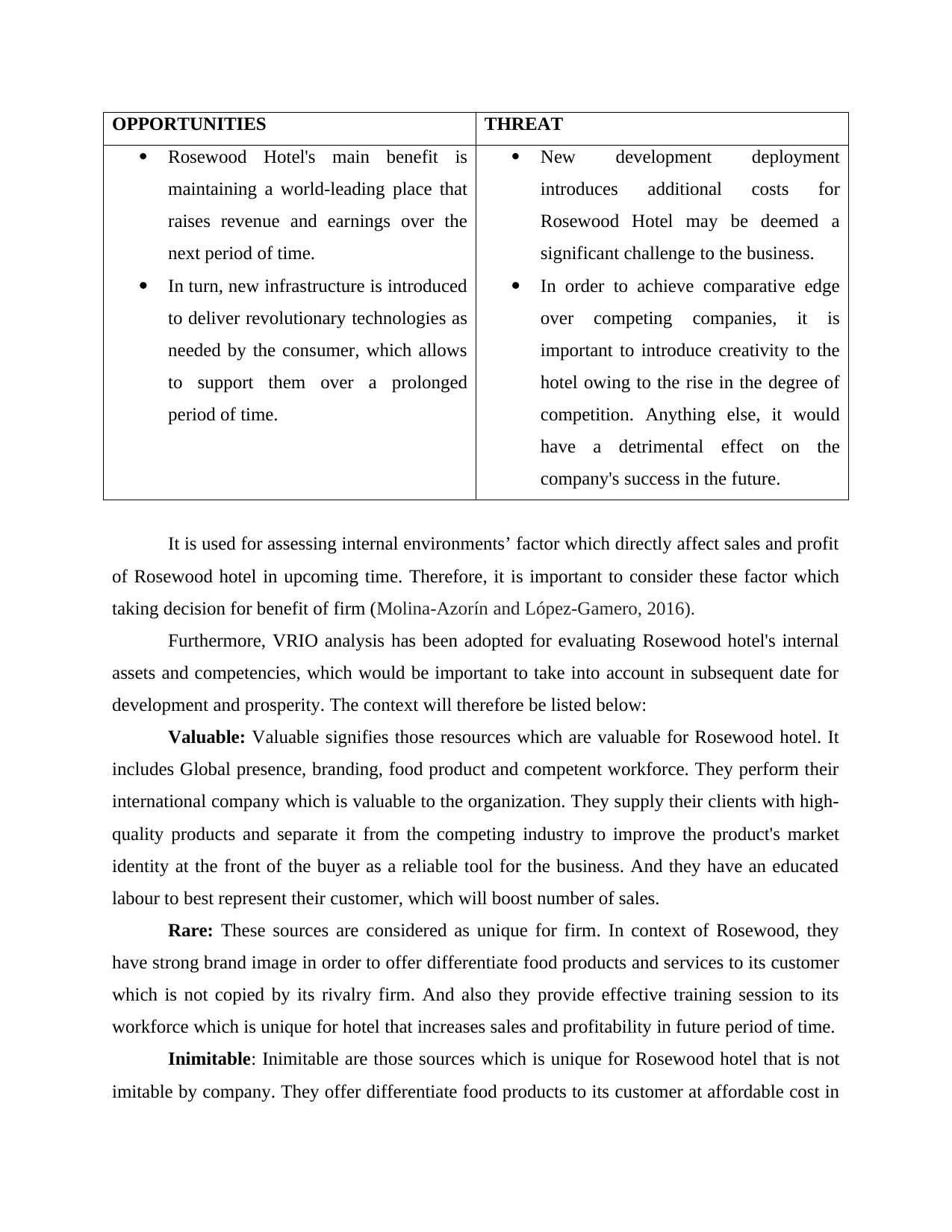
OPPORTUNITIES THREAT
Rosewood Hotel's main benefit is
maintaining a world-leading place that
raises revenue and earnings over the
next period of time.
In turn, new infrastructure is introduced
to deliver revolutionary technologies as
needed by the consumer, which allows
to support them over a prolonged
period of time.
New development deployment
introduces additional costs for
Rosewood Hotel may be deemed a
significant challenge to the business.
In order to achieve comparative edge
over competing companies, it is
important to introduce creativity to the
hotel owing to the rise in the degree of
competition. Anything else, it would
have a detrimental effect on the
company's success in the future.
It is used for assessing internal environments’ factor which directly affect sales and profit
of Rosewood hotel in upcoming time. Therefore, it is important to consider these factor which
taking decision for benefit of firm (Molina‐Azorín and López‐Gamero, 2016).
Furthermore, VRIO analysis has been adopted for evaluating Rosewood hotel's internal
assets and competencies, which would be important to take into account in subsequent date for
development and prosperity. The context will therefore be listed below:
Valuable: Valuable signifies those resources which are valuable for Rosewood hotel. It
includes Global presence, branding, food product and competent workforce. They perform their
international company which is valuable to the organization. They supply their clients with high-
quality products and separate it from the competing industry to improve the product's market
identity at the front of the buyer as a reliable tool for the business. And they have an educated
labour to best represent their customer, which will boost number of sales.
Rare: These sources are considered as unique for firm. In context of Rosewood, they
have strong brand image in order to offer differentiate food products and services to its customer
which is not copied by its rivalry firm. And also they provide effective training session to its
workforce which is unique for hotel that increases sales and profitability in future period of time.
Inimitable: Inimitable are those sources which is unique for Rosewood hotel that is not
imitable by company. They offer differentiate food products to its customer at affordable cost in
Rosewood Hotel's main benefit is
maintaining a world-leading place that
raises revenue and earnings over the
next period of time.
In turn, new infrastructure is introduced
to deliver revolutionary technologies as
needed by the consumer, which allows
to support them over a prolonged
period of time.
New development deployment
introduces additional costs for
Rosewood Hotel may be deemed a
significant challenge to the business.
In order to achieve comparative edge
over competing companies, it is
important to introduce creativity to the
hotel owing to the rise in the degree of
competition. Anything else, it would
have a detrimental effect on the
company's success in the future.
It is used for assessing internal environments’ factor which directly affect sales and profit
of Rosewood hotel in upcoming time. Therefore, it is important to consider these factor which
taking decision for benefit of firm (Molina‐Azorín and López‐Gamero, 2016).
Furthermore, VRIO analysis has been adopted for evaluating Rosewood hotel's internal
assets and competencies, which would be important to take into account in subsequent date for
development and prosperity. The context will therefore be listed below:
Valuable: Valuable signifies those resources which are valuable for Rosewood hotel. It
includes Global presence, branding, food product and competent workforce. They perform their
international company which is valuable to the organization. They supply their clients with high-
quality products and separate it from the competing industry to improve the product's market
identity at the front of the buyer as a reliable tool for the business. And they have an educated
labour to best represent their customer, which will boost number of sales.
Rare: These sources are considered as unique for firm. In context of Rosewood, they
have strong brand image in order to offer differentiate food products and services to its customer
which is not copied by its rivalry firm. And also they provide effective training session to its
workforce which is unique for hotel that increases sales and profitability in future period of time.
Inimitable: Inimitable are those sources which is unique for Rosewood hotel that is not
imitable by company. They offer differentiate food products to its customer at affordable cost in
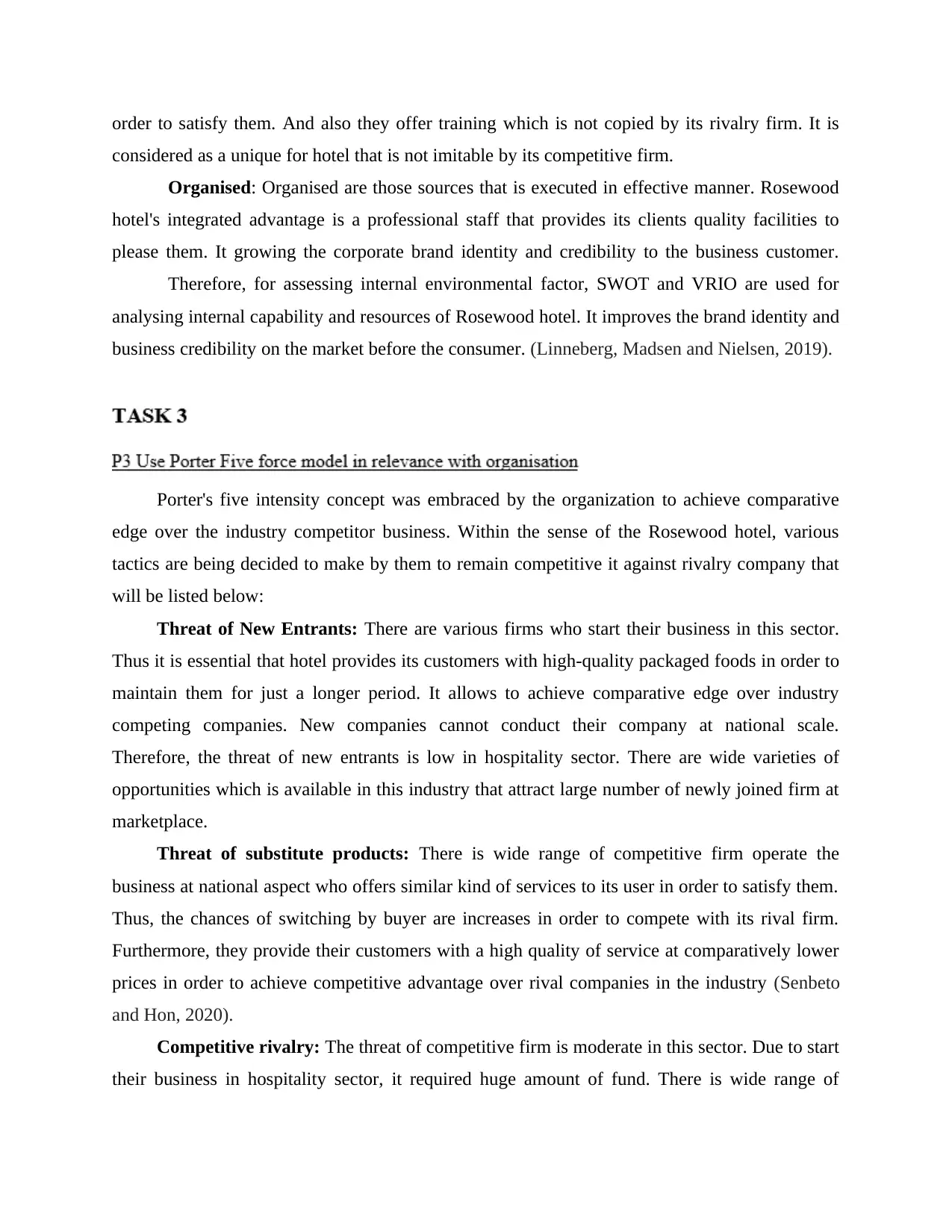
order to satisfy them. And also they offer training which is not copied by its rivalry firm. It is
considered as a unique for hotel that is not imitable by its competitive firm.
Organised: Organised are those sources that is executed in effective manner. Rosewood
hotel's integrated advantage is a professional staff that provides its clients quality facilities to
please them. It growing the corporate brand identity and credibility to the business customer.
Therefore, for assessing internal environmental factor, SWOT and VRIO are used for
analysing internal capability and resources of Rosewood hotel. It improves the brand identity and
business credibility on the market before the consumer. (Linneberg, Madsen and Nielsen, 2019).
Porter's five intensity concept was embraced by the organization to achieve comparative
edge over the industry competitor business. Within the sense of the Rosewood hotel, various
tactics are being decided to make by them to remain competitive it against rivalry company that
will be listed below:
Threat of New Entrants: There are various firms who start their business in this sector.
Thus it is essential that hotel provides its customers with high-quality packaged foods in order to
maintain them for just a longer period. It allows to achieve comparative edge over industry
competing companies. New companies cannot conduct their company at national scale.
Therefore, the threat of new entrants is low in hospitality sector. There are wide varieties of
opportunities which is available in this industry that attract large number of newly joined firm at
marketplace.
Threat of substitute products: There is wide range of competitive firm operate the
business at national aspect who offers similar kind of services to its user in order to satisfy them.
Thus, the chances of switching by buyer are increases in order to compete with its rival firm.
Furthermore, they provide their customers with a high quality of service at comparatively lower
prices in order to achieve competitive advantage over rival companies in the industry (Senbeto
and Hon, 2020).
Competitive rivalry: The threat of competitive firm is moderate in this sector. Due to start
their business in hospitality sector, it required huge amount of fund. There is wide range of
considered as a unique for hotel that is not imitable by its competitive firm.
Organised: Organised are those sources that is executed in effective manner. Rosewood
hotel's integrated advantage is a professional staff that provides its clients quality facilities to
please them. It growing the corporate brand identity and credibility to the business customer.
Therefore, for assessing internal environmental factor, SWOT and VRIO are used for
analysing internal capability and resources of Rosewood hotel. It improves the brand identity and
business credibility on the market before the consumer. (Linneberg, Madsen and Nielsen, 2019).
Porter's five intensity concept was embraced by the organization to achieve comparative
edge over the industry competitor business. Within the sense of the Rosewood hotel, various
tactics are being decided to make by them to remain competitive it against rivalry company that
will be listed below:
Threat of New Entrants: There are various firms who start their business in this sector.
Thus it is essential that hotel provides its customers with high-quality packaged foods in order to
maintain them for just a longer period. It allows to achieve comparative edge over industry
competing companies. New companies cannot conduct their company at national scale.
Therefore, the threat of new entrants is low in hospitality sector. There are wide varieties of
opportunities which is available in this industry that attract large number of newly joined firm at
marketplace.
Threat of substitute products: There is wide range of competitive firm operate the
business at national aspect who offers similar kind of services to its user in order to satisfy them.
Thus, the chances of switching by buyer are increases in order to compete with its rival firm.
Furthermore, they provide their customers with a high quality of service at comparatively lower
prices in order to achieve competitive advantage over rival companies in the industry (Senbeto
and Hon, 2020).
Competitive rivalry: The threat of competitive firm is moderate in this sector. Due to start
their business in hospitality sector, it required huge amount of fund. There is wide range of
Paraphrase This Document
Need a fresh take? Get an instant paraphrase of this document with our AI Paraphraser
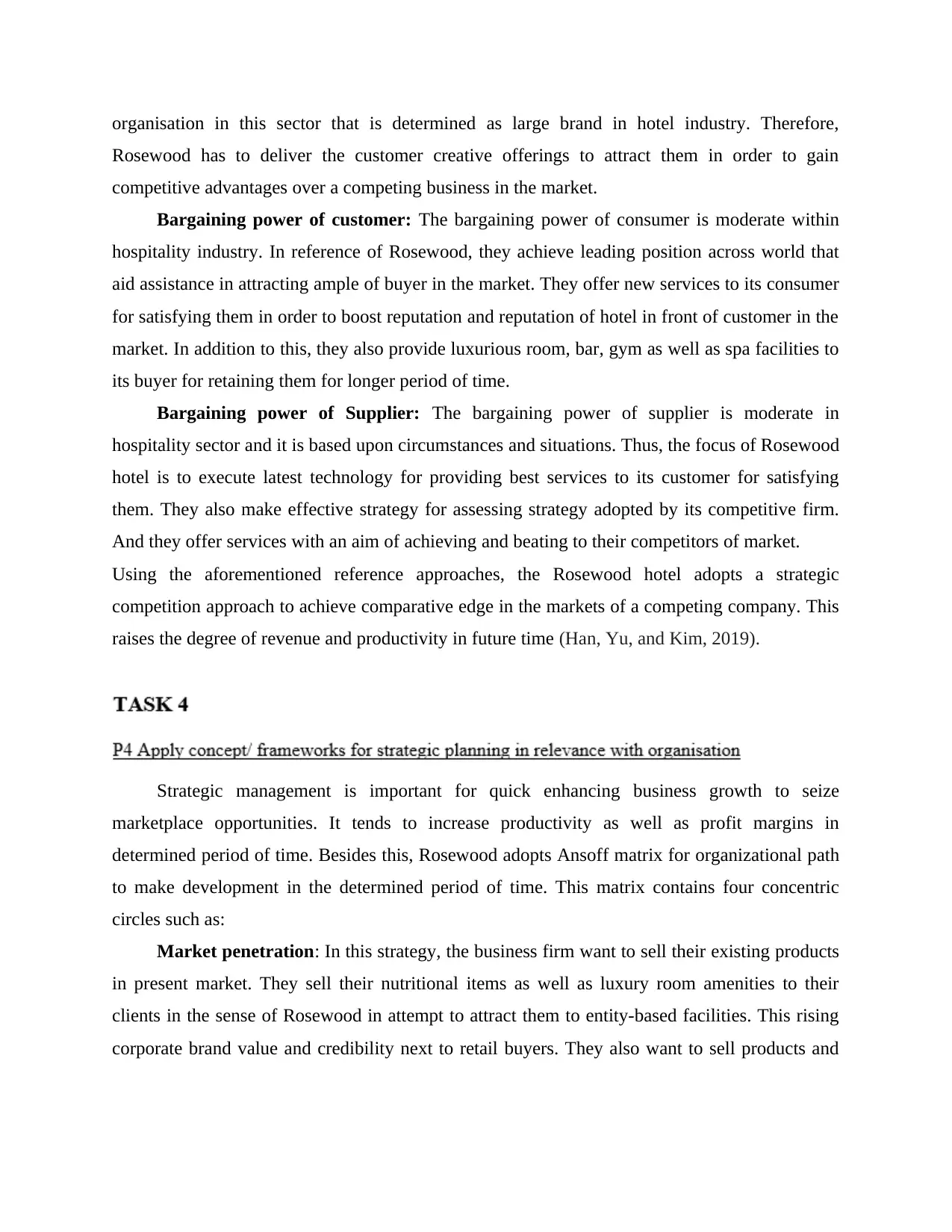
organisation in this sector that is determined as large brand in hotel industry. Therefore,
Rosewood has to deliver the customer creative offerings to attract them in order to gain
competitive advantages over a competing business in the market.
Bargaining power of customer: The bargaining power of consumer is moderate within
hospitality industry. In reference of Rosewood, they achieve leading position across world that
aid assistance in attracting ample of buyer in the market. They offer new services to its consumer
for satisfying them in order to boost reputation and reputation of hotel in front of customer in the
market. In addition to this, they also provide luxurious room, bar, gym as well as spa facilities to
its buyer for retaining them for longer period of time.
Bargaining power of Supplier: The bargaining power of supplier is moderate in
hospitality sector and it is based upon circumstances and situations. Thus, the focus of Rosewood
hotel is to execute latest technology for providing best services to its customer for satisfying
them. They also make effective strategy for assessing strategy adopted by its competitive firm.
And they offer services with an aim of achieving and beating to their competitors of market.
Using the aforementioned reference approaches, the Rosewood hotel adopts a strategic
competition approach to achieve comparative edge in the markets of a competing company. This
raises the degree of revenue and productivity in future time (Han, Yu, and Kim, 2019).
Strategic management is important for quick enhancing business growth to seize
marketplace opportunities. It tends to increase productivity as well as profit margins in
determined period of time. Besides this, Rosewood adopts Ansoff matrix for organizational path
to make development in the determined period of time. This matrix contains four concentric
circles such as:
Market penetration: In this strategy, the business firm want to sell their existing products
in present market. They sell their nutritional items as well as luxury room amenities to their
clients in the sense of Rosewood in attempt to attract them to entity-based facilities. This rising
corporate brand value and credibility next to retail buyers. They also want to sell products and
Rosewood has to deliver the customer creative offerings to attract them in order to gain
competitive advantages over a competing business in the market.
Bargaining power of customer: The bargaining power of consumer is moderate within
hospitality industry. In reference of Rosewood, they achieve leading position across world that
aid assistance in attracting ample of buyer in the market. They offer new services to its consumer
for satisfying them in order to boost reputation and reputation of hotel in front of customer in the
market. In addition to this, they also provide luxurious room, bar, gym as well as spa facilities to
its buyer for retaining them for longer period of time.
Bargaining power of Supplier: The bargaining power of supplier is moderate in
hospitality sector and it is based upon circumstances and situations. Thus, the focus of Rosewood
hotel is to execute latest technology for providing best services to its customer for satisfying
them. They also make effective strategy for assessing strategy adopted by its competitive firm.
And they offer services with an aim of achieving and beating to their competitors of market.
Using the aforementioned reference approaches, the Rosewood hotel adopts a strategic
competition approach to achieve comparative edge in the markets of a competing company. This
raises the degree of revenue and productivity in future time (Han, Yu, and Kim, 2019).
Strategic management is important for quick enhancing business growth to seize
marketplace opportunities. It tends to increase productivity as well as profit margins in
determined period of time. Besides this, Rosewood adopts Ansoff matrix for organizational path
to make development in the determined period of time. This matrix contains four concentric
circles such as:
Market penetration: In this strategy, the business firm want to sell their existing products
in present market. They sell their nutritional items as well as luxury room amenities to their
clients in the sense of Rosewood in attempt to attract them to entity-based facilities. This rising
corporate brand value and credibility next to retail buyers. They also want to sell products and
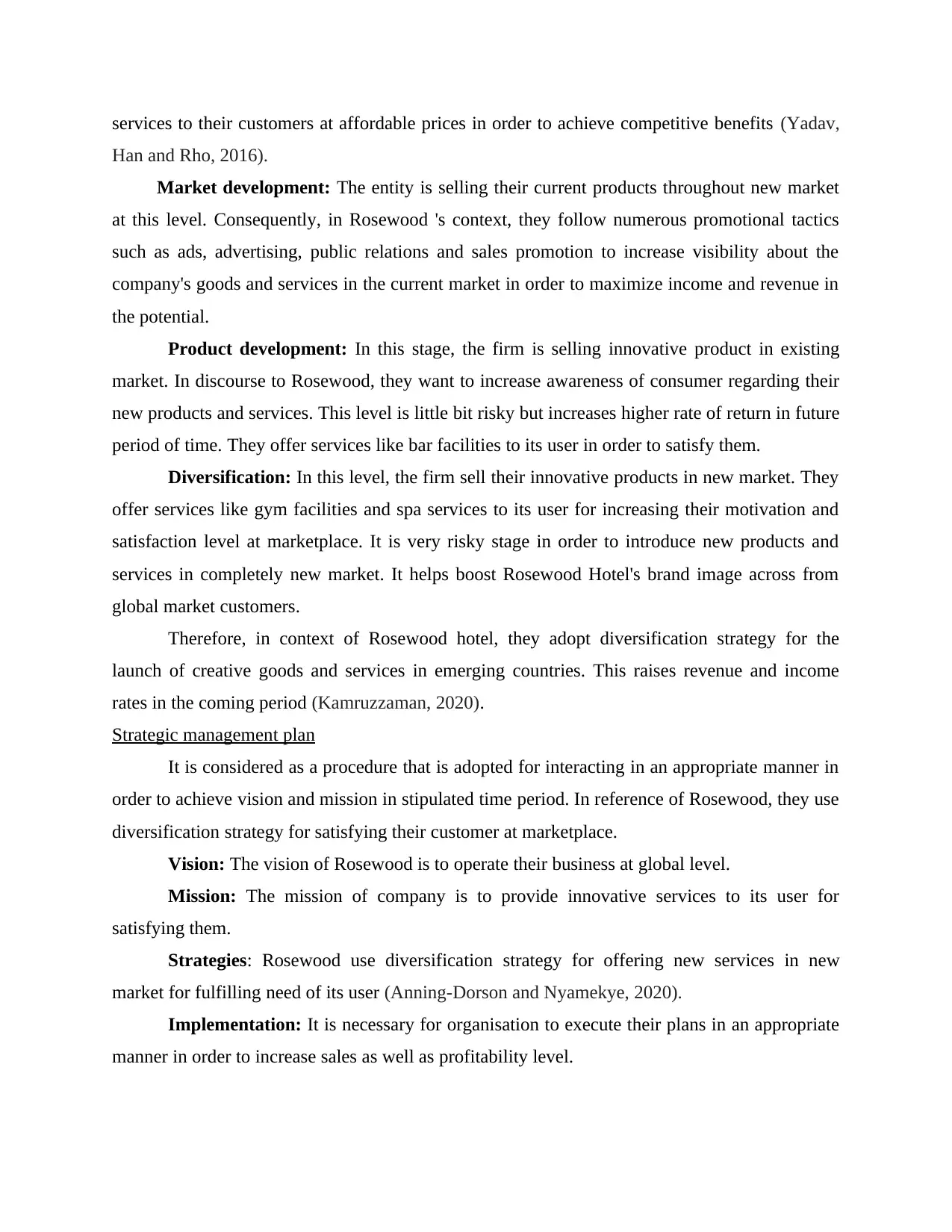
services to their customers at affordable prices in order to achieve competitive benefits (Yadav,
Han and Rho, 2016).
Market development: The entity is selling their current products throughout new market
at this level. Consequently, in Rosewood 's context, they follow numerous promotional tactics
such as ads, advertising, public relations and sales promotion to increase visibility about the
company's goods and services in the current market in order to maximize income and revenue in
the potential.
Product development: In this stage, the firm is selling innovative product in existing
market. In discourse to Rosewood, they want to increase awareness of consumer regarding their
new products and services. This level is little bit risky but increases higher rate of return in future
period of time. They offer services like bar facilities to its user in order to satisfy them.
Diversification: In this level, the firm sell their innovative products in new market. They
offer services like gym facilities and spa services to its user for increasing their motivation and
satisfaction level at marketplace. It is very risky stage in order to introduce new products and
services in completely new market. It helps boost Rosewood Hotel's brand image across from
global market customers.
Therefore, in context of Rosewood hotel, they adopt diversification strategy for the
launch of creative goods and services in emerging countries. This raises revenue and income
rates in the coming period (Kamruzzaman, 2020).
Strategic management plan
It is considered as a procedure that is adopted for interacting in an appropriate manner in
order to achieve vision and mission in stipulated time period. In reference of Rosewood, they use
diversification strategy for satisfying their customer at marketplace.
Vision: The vision of Rosewood is to operate their business at global level.
Mission: The mission of company is to provide innovative services to its user for
satisfying them.
Strategies: Rosewood use diversification strategy for offering new services in new
market for fulfilling need of its user (Anning-Dorson and Nyamekye, 2020).
Implementation: It is necessary for organisation to execute their plans in an appropriate
manner in order to increase sales as well as profitability level.
Han and Rho, 2016).
Market development: The entity is selling their current products throughout new market
at this level. Consequently, in Rosewood 's context, they follow numerous promotional tactics
such as ads, advertising, public relations and sales promotion to increase visibility about the
company's goods and services in the current market in order to maximize income and revenue in
the potential.
Product development: In this stage, the firm is selling innovative product in existing
market. In discourse to Rosewood, they want to increase awareness of consumer regarding their
new products and services. This level is little bit risky but increases higher rate of return in future
period of time. They offer services like bar facilities to its user in order to satisfy them.
Diversification: In this level, the firm sell their innovative products in new market. They
offer services like gym facilities and spa services to its user for increasing their motivation and
satisfaction level at marketplace. It is very risky stage in order to introduce new products and
services in completely new market. It helps boost Rosewood Hotel's brand image across from
global market customers.
Therefore, in context of Rosewood hotel, they adopt diversification strategy for the
launch of creative goods and services in emerging countries. This raises revenue and income
rates in the coming period (Kamruzzaman, 2020).
Strategic management plan
It is considered as a procedure that is adopted for interacting in an appropriate manner in
order to achieve vision and mission in stipulated time period. In reference of Rosewood, they use
diversification strategy for satisfying their customer at marketplace.
Vision: The vision of Rosewood is to operate their business at global level.
Mission: The mission of company is to provide innovative services to its user for
satisfying them.
Strategies: Rosewood use diversification strategy for offering new services in new
market for fulfilling need of its user (Anning-Dorson and Nyamekye, 2020).
Implementation: It is necessary for organisation to execute their plans in an appropriate
manner in order to increase sales as well as profitability level.
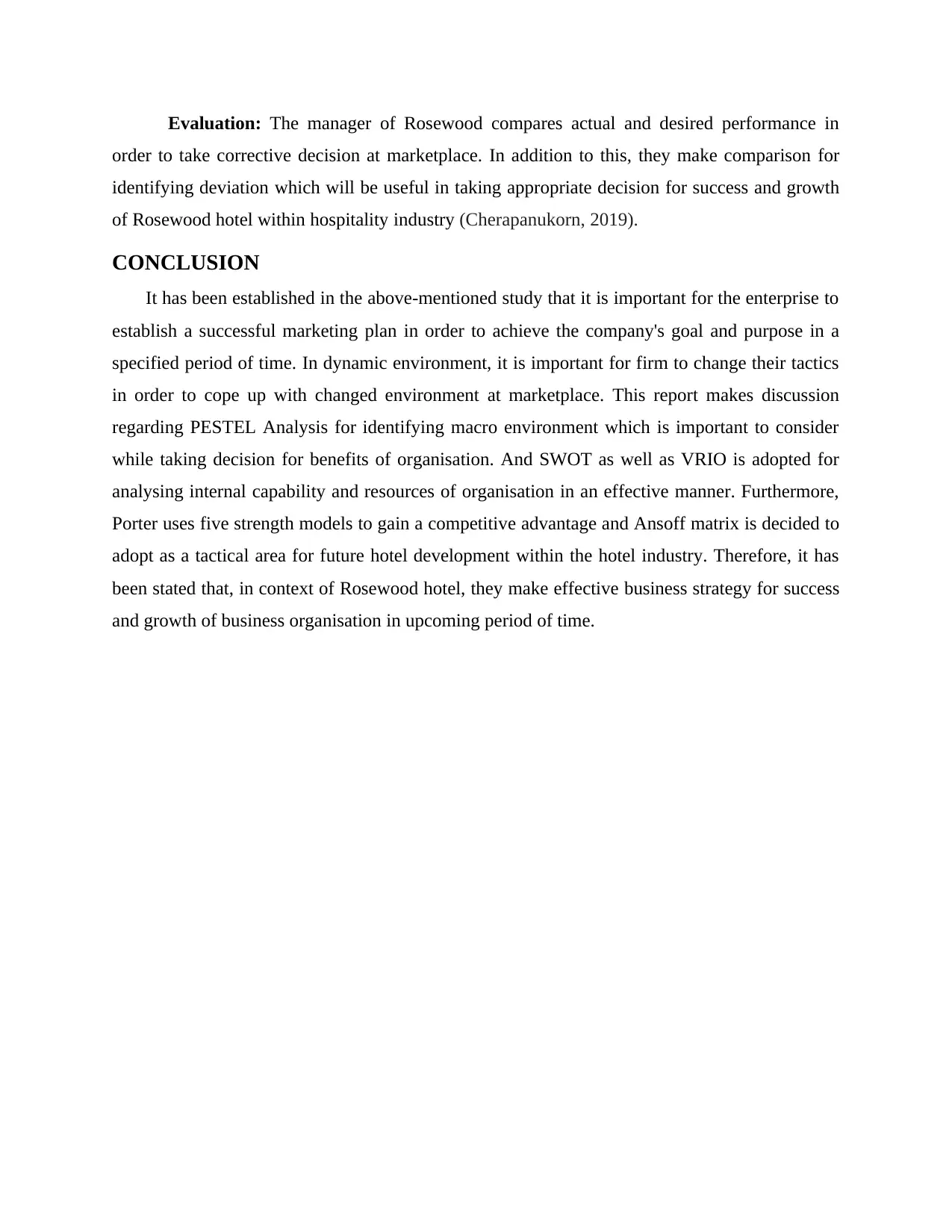
Evaluation: The manager of Rosewood compares actual and desired performance in
order to take corrective decision at marketplace. In addition to this, they make comparison for
identifying deviation which will be useful in taking appropriate decision for success and growth
of Rosewood hotel within hospitality industry (Cherapanukorn, 2019).
CONCLUSION
It has been established in the above-mentioned study that it is important for the enterprise to
establish a successful marketing plan in order to achieve the company's goal and purpose in a
specified period of time. In dynamic environment, it is important for firm to change their tactics
in order to cope up with changed environment at marketplace. This report makes discussion
regarding PESTEL Analysis for identifying macro environment which is important to consider
while taking decision for benefits of organisation. And SWOT as well as VRIO is adopted for
analysing internal capability and resources of organisation in an effective manner. Furthermore,
Porter uses five strength models to gain a competitive advantage and Ansoff matrix is decided to
adopt as a tactical area for future hotel development within the hotel industry. Therefore, it has
been stated that, in context of Rosewood hotel, they make effective business strategy for success
and growth of business organisation in upcoming period of time.
order to take corrective decision at marketplace. In addition to this, they make comparison for
identifying deviation which will be useful in taking appropriate decision for success and growth
of Rosewood hotel within hospitality industry (Cherapanukorn, 2019).
CONCLUSION
It has been established in the above-mentioned study that it is important for the enterprise to
establish a successful marketing plan in order to achieve the company's goal and purpose in a
specified period of time. In dynamic environment, it is important for firm to change their tactics
in order to cope up with changed environment at marketplace. This report makes discussion
regarding PESTEL Analysis for identifying macro environment which is important to consider
while taking decision for benefits of organisation. And SWOT as well as VRIO is adopted for
analysing internal capability and resources of organisation in an effective manner. Furthermore,
Porter uses five strength models to gain a competitive advantage and Ansoff matrix is decided to
adopt as a tactical area for future hotel development within the hotel industry. Therefore, it has
been stated that, in context of Rosewood hotel, they make effective business strategy for success
and growth of business organisation in upcoming period of time.
Secure Best Marks with AI Grader
Need help grading? Try our AI Grader for instant feedback on your assignments.
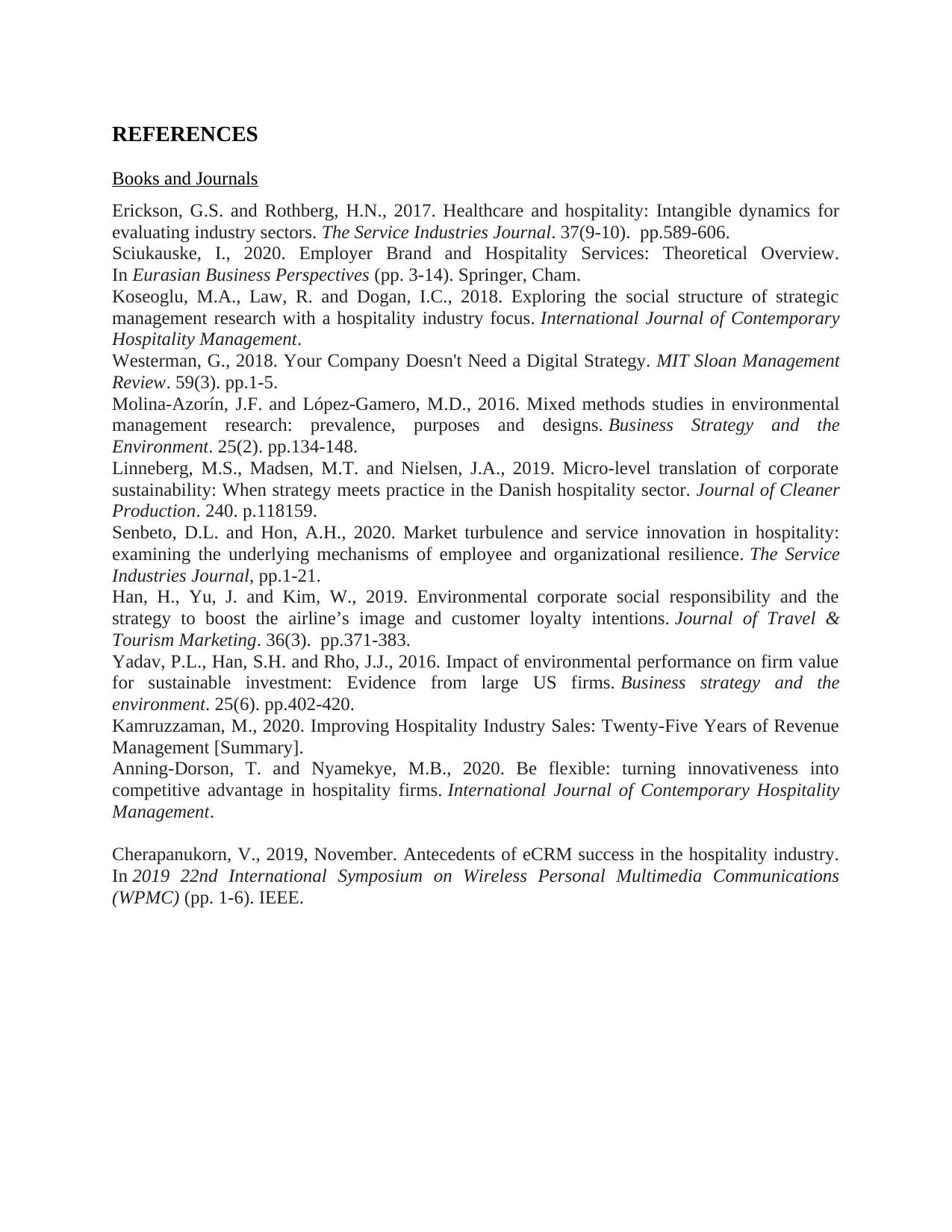
REFERENCES
Books and Journals
Erickson, G.S. and Rothberg, H.N., 2017. Healthcare and hospitality: Intangible dynamics for
evaluating industry sectors. The Service Industries Journal. 37(9-10). pp.589-606.
Sciukauske, I., 2020. Employer Brand and Hospitality Services: Theoretical Overview.
In Eurasian Business Perspectives (pp. 3-14). Springer, Cham.
Koseoglu, M.A., Law, R. and Dogan, I.C., 2018. Exploring the social structure of strategic
management research with a hospitality industry focus. International Journal of Contemporary
Hospitality Management.
Westerman, G., 2018. Your Company Doesn't Need a Digital Strategy. MIT Sloan Management
Review. 59(3). pp.1-5.
Molina‐Azorín, J.F. and López‐Gamero, M.D., 2016. Mixed methods studies in environmental
management research: prevalence, purposes and designs. Business Strategy and the
Environment. 25(2). pp.134-148.
Linneberg, M.S., Madsen, M.T. and Nielsen, J.A., 2019. Micro-level translation of corporate
sustainability: When strategy meets practice in the Danish hospitality sector. Journal of Cleaner
Production. 240. p.118159.
Senbeto, D.L. and Hon, A.H., 2020. Market turbulence and service innovation in hospitality:
examining the underlying mechanisms of employee and organizational resilience. The Service
Industries Journal, pp.1-21.
Han, H., Yu, J. and Kim, W., 2019. Environmental corporate social responsibility and the
strategy to boost the airline’s image and customer loyalty intentions. Journal of Travel &
Tourism Marketing. 36(3). pp.371-383.
Yadav, P.L., Han, S.H. and Rho, J.J., 2016. Impact of environmental performance on firm value
for sustainable investment: Evidence from large US firms. Business strategy and the
environment. 25(6). pp.402-420.
Kamruzzaman, M., 2020. Improving Hospitality Industry Sales: Twenty-Five Years of Revenue
Management [Summary].
Anning-Dorson, T. and Nyamekye, M.B., 2020. Be flexible: turning innovativeness into
competitive advantage in hospitality firms. International Journal of Contemporary Hospitality
Management.
Cherapanukorn, V., 2019, November. Antecedents of eCRM success in the hospitality industry.
In 2019 22nd International Symposium on Wireless Personal Multimedia Communications
(WPMC) (pp. 1-6). IEEE.
Books and Journals
Erickson, G.S. and Rothberg, H.N., 2017. Healthcare and hospitality: Intangible dynamics for
evaluating industry sectors. The Service Industries Journal. 37(9-10). pp.589-606.
Sciukauske, I., 2020. Employer Brand and Hospitality Services: Theoretical Overview.
In Eurasian Business Perspectives (pp. 3-14). Springer, Cham.
Koseoglu, M.A., Law, R. and Dogan, I.C., 2018. Exploring the social structure of strategic
management research with a hospitality industry focus. International Journal of Contemporary
Hospitality Management.
Westerman, G., 2018. Your Company Doesn't Need a Digital Strategy. MIT Sloan Management
Review. 59(3). pp.1-5.
Molina‐Azorín, J.F. and López‐Gamero, M.D., 2016. Mixed methods studies in environmental
management research: prevalence, purposes and designs. Business Strategy and the
Environment. 25(2). pp.134-148.
Linneberg, M.S., Madsen, M.T. and Nielsen, J.A., 2019. Micro-level translation of corporate
sustainability: When strategy meets practice in the Danish hospitality sector. Journal of Cleaner
Production. 240. p.118159.
Senbeto, D.L. and Hon, A.H., 2020. Market turbulence and service innovation in hospitality:
examining the underlying mechanisms of employee and organizational resilience. The Service
Industries Journal, pp.1-21.
Han, H., Yu, J. and Kim, W., 2019. Environmental corporate social responsibility and the
strategy to boost the airline’s image and customer loyalty intentions. Journal of Travel &
Tourism Marketing. 36(3). pp.371-383.
Yadav, P.L., Han, S.H. and Rho, J.J., 2016. Impact of environmental performance on firm value
for sustainable investment: Evidence from large US firms. Business strategy and the
environment. 25(6). pp.402-420.
Kamruzzaman, M., 2020. Improving Hospitality Industry Sales: Twenty-Five Years of Revenue
Management [Summary].
Anning-Dorson, T. and Nyamekye, M.B., 2020. Be flexible: turning innovativeness into
competitive advantage in hospitality firms. International Journal of Contemporary Hospitality
Management.
Cherapanukorn, V., 2019, November. Antecedents of eCRM success in the hospitality industry.
In 2019 22nd International Symposium on Wireless Personal Multimedia Communications
(WPMC) (pp. 1-6). IEEE.

1 out of 12
Related Documents
Your All-in-One AI-Powered Toolkit for Academic Success.
+13062052269
info@desklib.com
Available 24*7 on WhatsApp / Email
![[object Object]](/_next/static/media/star-bottom.7253800d.svg)
Unlock your academic potential
© 2024 | Zucol Services PVT LTD | All rights reserved.





